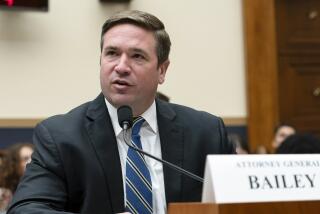Bankruptcy Non-Reform
- Share via
The credit card industry has hijacked efforts to reform bankruptcy laws. The House and Senate bills headed for floor votes are clothed cleverly in the rhetoric of reform, and change is certainly needed. But in reality they would significantly weaken protections for truly needy debtors and leave unchanged gaping loopholes in the law that savvy--and typically wealthy--filers use to put up the shield of bankruptcy to thwart creditors and lawsuits.
Bankruptcy judges, legal scholars and consumer groups are raising objections, yet Congress seems intent on ramming through frightfully flawed and sweeping changes in the complex law of bankruptcy. Virtually none of the recommendations from the 1997 congressional National Bankruptcy Review Commission are included.
With consumer bankruptcy filings rising to a new high despite a robust economy, the credit card industry claims that too many consumers are simply avoiding their debts by seeking refuge from creditors under bankruptcy laws. The industry mistakenly presumes that filers are simply deadbeats abusing the law. In fact most consumers file for bankruptcy only as a last resort after suffering some major setback, such as job loss or massive medical bills.
Historically, personal bankruptcies rise and fall with the level of consumer debt per household. Credit card companies have been a major source of easy credit, especially for low-income consumers, and helped boost consumer indebtedness. In 1996, the average person who filed under Chapter 7, which eliminates all debts, had an after-tax income of $19,800 and credit card debt of $17,544.
Credit card issuers are unwilling to take into account--and assume full responsibility for--their aggressive and injudicious extension of credit. Instead they and their skilled Washington lobbyists have managed to get bills that would, for the first time, apply means testing so that consumers with incomes above $50,000 would be prevented from seeking protection under Chapter 7 and forced to arrange at least partial payments. But high-income filers who can afford lawyers can still shield assets, because the bills do not change existing loopholes that allow, for instance, the transfer of assets to trusts.
Most disturbing are provisions that enable creditors to challenge any Chapter 7 filing, regardless of the consumer’s income. Just as outrageous, unsecured credit card debt would be reclassified as an non-dischargeable debt, in the same category as child support, alimony and taxes. Women could have a harder time collecting child support if their ex-husbands had to decide between meeting family obligations or fending off aggressive collection agents.
The House and Senate bills do nothing to root out real abuse at the high end and would give creditors undue leverage over low-income consumers. They also would add new complexity and costs. This is no reform, and consumers should let lawmakers hear about it.
To Take Action: Contact your representative through the congressional switchboard, (202) 224-3121. Or call Sen. Barbara Boxer, (202) 224-3553 or (310) 414-5700, e-mail: senator@boxer.senate.gov, or Sen. Dianne Feinstein, (202) 224-3841 or (310) 914-7300, e-mail:senator@feinstein.senate.gov.
More to Read
Inside the business of entertainment
The Wide Shot brings you news, analysis and insights on everything from streaming wars to production — and what it all means for the future.
You may occasionally receive promotional content from the Los Angeles Times.










